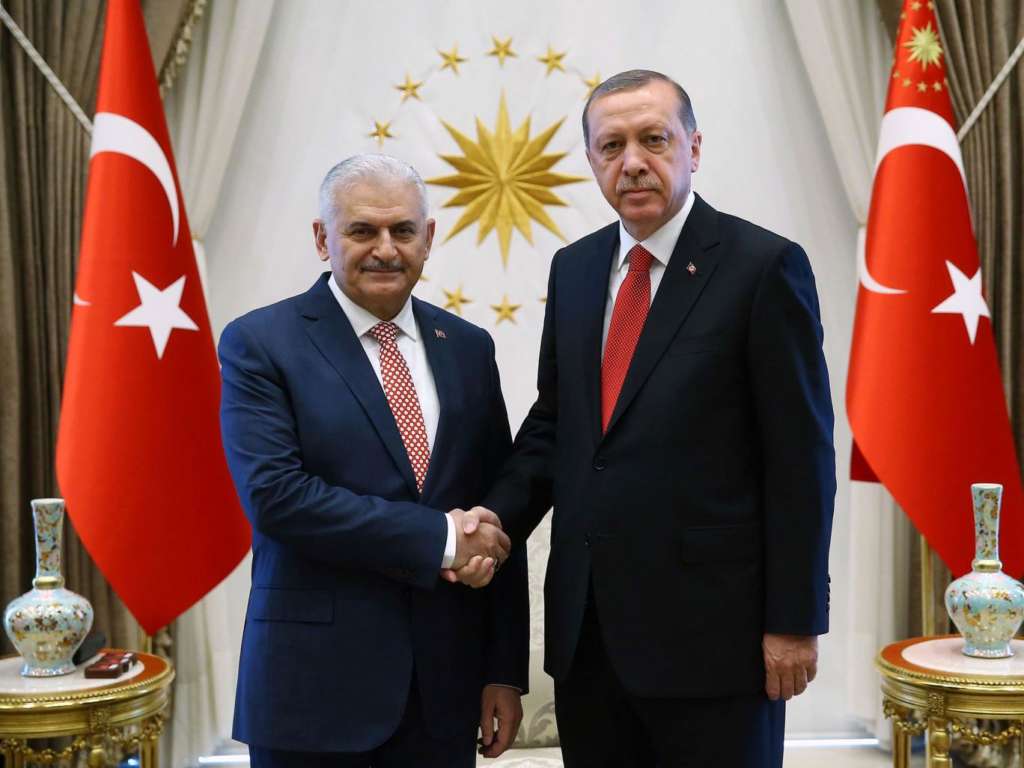Turkish President Recep Tayyip Erdogan on Tuesday approved a new government formed by one of his most trusted allies, who vowed immediately to start work immediately on forging the stronger presidency wanted by Erdogan.
Binali Yildirim, 60, was elected as leader of the AKP unopposed on 22 May, replacing Ahmet Davutoglu, who stepped down on Sunday amid a range of differences with the president.
He has served as transport and communications minister since 2002, with a short interruption in 2015, and is a founding member of the ruling Justice and Development Party (AKP). He has been credited for his role in developing major infrastructure projects that have helped buoy Turkey’s economy and boost the party’s popularity.
Yildirim said he would prioritize growth by boosting production, encourage investment and job creation, and maintain fiscal discipline, in a sign of continuity with policies that fueled Turkey’s growth during the AKP’s first decade in power.
“We will immediately start work to achieve a new constitution, including a presidential system,” Yildirim told lawmakers of his Justice and Development Party, or AKP, in his first speech after taking office.
“Our priority is to make the constitution in harmony with the de-facto situation regarding our president’s ties to the people,” Yildirim said.
Many fear the presidential system that Erdogan seeks will concentrate too many powers in the hands of the Turkish strongman.
Two days after stepping into his new role as AK Party chairman, Yildirim announced his new cabinet lineup, which he is widely believed to have formed in consultation with Erdogan.
The new government includes nine new names, although most ministers from Davutoglu’s previous Cabinet retained key portfolios.
They include Mevlut Cavusoglu, who remains foreign minister, and Mehmet Simsek, the deputy minister who heads economic affairs. Also, Erdogan’s son-in-law, Berat Albayrak, kept his position as energy minister.
The biggest change was replacing EU Minister Volkan Bozkir, whose post will be taken over by Omer Celik, a founding member of the AKP who is known to be close to the president.
Holding to his influence over the government, Erdogan was scheduled to chair the new Cabinet’s first meeting at his palace on Wednesday.
Domestically, the political reshuffling takes place as Turkey faces serious security threats including increased attacks by Kurdish and ISIS militants. It is also comes as parliament is in disarray after a government-backed constitutional amendment has left 138 lawmakers vulnerable to prosecution.
Internationally, Turkey is also facing a delicate moment in its relations with the European Union. The implementation of a Turkey-EU deal to help stem the influx of migrants to Europe — which Davutoglu had helped negotiate — has repeatedly come into question.
Erdogan has warned that the migrant deal could collapse if the Europeans break their word on granting Turkish citizens the right to visa-free travel. The EU says Ankara must meet all of the EU’s conditions to secure visa-free travel, including narrowing the definition of “terrorist” — which Erdogan says is out of the question.
